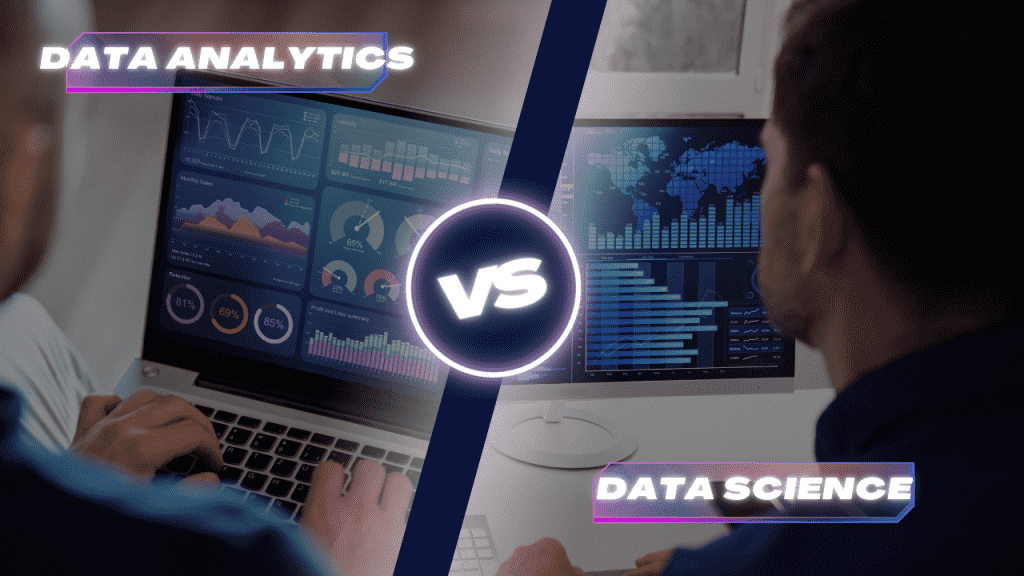In today’s data-driven world, organizations are leveraging insights from vast amounts of information to make smarter decisions, improve efficiency, and innovate. Two fields that play a central role in this process are Data Analytics and Data Science. While these terms are often used interchangeably, they represent distinct domains with unique purposes, methodologies, and outcomes. Let’s dive into the fundamental differences between data analytics and data science, helping you understand their roles, tools, and career prospects.
What is Data Analytics?
Definition: Data analytics focuses on analyzing historical data to extract actionable insights and solve specific business problems. It’s about answering questions like “What happened?” and “Why did it happen?” through statistical methods and visualization tools.
Key Characteristics:
- Goal-Oriented: Aimed at providing specific answers to well-defined problems.
- Data-Centric: Works with structured datasets to identify trends, patterns, and correlations.
- Tools Used: Excel, Tableau, Power BI, SQL, SAS, and Python (for basic analytics).
Applications:
- Market trend analysis to understand customer behavior.
- Financial forecasting for budgeting and investment planning.
- Performance analysis in industries like retail, healthcare, and logistics.
Example: An e-commerce company uses data analytics to evaluate past sales performance and determine which products are most popular during holiday seasons.
If you’re looking to advance in this field, data analytics courses can equip you with the technical skills and knowledge needed to excel.
What is Data Science?
Definition: Data science is a broader and more complex field that combines mathematics, statistics, computer science, and domain knowledge to extract meaningful insights from structured and unstructured data. It involves predictive modeling, machine learning, and artificial intelligence to answer questions like “What will happen?” or “How can we make it happen?”
Key Characteristics:
- Innovative Approach: Aims to predict future trends and automate processes.
- Algorithm-Driven: Employs advanced techniques such as machine learning and deep learning.
- Tools Used: Python, R, TensorFlow, Hadoop, Apache Spark, and cloud platforms like AWS and Azure.
Applications:
- Fraud detection using machine learning models in banking.
- Recommendation systems for platforms like Netflix and Amazon.
- Predictive maintenance in manufacturing industries.
Example: A healthcare provider uses data science to develop AI models that predict patient readmission risks based on historical and real-time data.
Pursuing a masters in data analytics or data science can provide a comprehensive foundation for exploring cutting-edge opportunities in these fields.
Key Differences Between Data Analytics and Data Science
Aspect | Data Analytics | Data Science |
Purpose | Focuses on understanding historical data. | Predicts future outcomes and automates tasks. |
Scope | Narrow and problem-specific. | Broad, encompassing data engineering and AI. |
Skill Set | Strong analytical and visualization skills. | Expertise in programming, machine learning, and statistics. |
Data Type | Primarily structured data. | Structured and unstructured data. |
Tools | Tableau, Excel, SQL, Power BI. | Python, R, TensorFlow, Apache Spark. |
Which Field Should You Choose?
The choice between data analytics and data science depends on your interests, career goals, and the type of impact you wish to make:
- Choose Data Analytics if you enjoy working with structured data, generating reports, and finding actionable insights for immediate business decisions. A solid understanding gained from data analytics courses can kickstart your journey in this domain.
- Choose Data Science if you’re passionate about programming, solving complex problems, and building predictive models using AI and machine learning. For those aiming to lead in the field, a masters in data analytics or data science can open doors to advanced roles.
Both fields offer lucrative opportunities and are critical to the success of modern businesses. Embarking on a career in data analytics or data science allows you to be part of this transformative era.
Conclusion
While data analytics and data science share a common goal of deriving value from data, they differ significantly in their approaches, tools, and outcomes. Data analytics is a more focused field aimed at solving specific business problems, whereas data science offers a holistic and innovative approach to understanding and leveraging data.
Understanding these differences will help you identify the right path for your career or business needs. Whether you’re interested in uncovering insights from past data or developing cutting-edge AI solutions, there’s a place for you in the exciting world of data. Start with the right data analytics courses or explore a masters in data analytics to unlock your potential.

